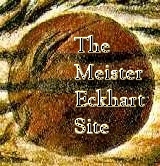|
|
||
 |
Meister Eckhart Home / Works by Meister Eckhart - Quotes / Inspired by Eckhart / Studies / The Papal Condemnation / Mail & Announcements / Links / Books |
AMY HOLLYWOOD
From: M. Rubin, W. Simons (ed.), The Cambridge History of Christianity, v. 4, Christianity in Western Europe, c. 1100 - c. 1500, Cambridge 2009 (Pages 297-307).
Page 8
Even more clearly at odds with the Augustinian tradition is the development, in the thirteenth century, of accounts of divine union lasting not for brief moments, but for hours, days, perhaps even for a lifetime. Bernard of Clairvaux once again sets the background against which the innovative nature of these claims becomes visible. Like Augustine in the Confessions, Bernard insists that any experience of union with God is exceptional and fleetingwhile in this life:
I shall call him blessed and holy to whom it is given to experience even for a single instant something which is rare indeed in this life. To lose yourself as though you did not exist and to have no sense of yourself, to be emptied of yourself (Phil. 2. 7) and almost annihilated, belongs to heavenly not to human love. [14]
Bernard represents the mainstream of the medieval tradition, which makes use of a specialised language to describe union with God and the heights of the contemplative life, always understood as necessarily brief. [15] As the thirteenth- century beguine Mechthild of Magdeburg insists, to remain in such a state would be 'death' to the senses and the body. [16]
Yet in the mystical hagiographies of women and men produced in the Low Countries during the thirteenth century, we begin to see accounts of ecstasies and raptures that last for days and weeks on end. James of Vitry (c. 1170–1240), for example, in his life of the beguine Marie of Oignies (1176–1213), describes her long ecstatic raptures:
Sometimes she would gently rest with the Lord in a sweet and blessed silence for thirty-five days and she never ate any corporeal food and could utter no word except this alone: 'I want the Body of Our Lord Jesus Christ. 'When she had received it, she would remain with the Lord in silence for whole days at a time. On those days she had the feeling that her spirit was separated, as it were, from her body … and … so abstracted was she from sensible things and rapt above herself in some kind of ecstasy (excessus). Finally, after fiveweeks, she returned to herself and opened her mouth and received corporeal food and she spoke to those who had been standing around her and who had been struck with wonder. [17]
[14] Bernard of Clairvaux, Selected Works, 'On LovingGod', X, 27, 195.
[15] For the brevity of union in Gregory the Great and Bernard of Clairvaux, seeMcGinn, Growth of Mysticism, 63–70, 190–3 and 208–13.
[16] Most famously, see Mechthild of Magdeburg, The Flowing Light of the Godhead, trans. Frank Tobin (New York: Paulist Press, 1993), Book I, ch. 44, 58–62.
[17] Jacques deVitry, The Life of Marie d'Oignies, trans. Margot H. King (Toronto: Peregrina Publishing, 1998), Book I, n. 25, 65–6.